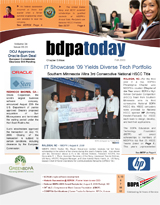|
|
|
bdpatoday
Volume 31 | 10.02.09 |
|
|
|
|
|
bdpatoday blogs, discussions, and
event calendars are enhanced by 
2009 Annual Awards Banquet | NOV 12
Reserve tables or tickets today. RSVP on or before October 31.
bdpatoday | online
Missed one? In case we missed you yesterday, our newsletter archives and Acronym of the Day are updated each week for new sponsors, BDPA chapter interest groups (CIGs) and new BDPA members up to the last 100 online editions. Discover more...
NEA | Students live in a Digital World. Are schools and local communities ready to join them?
bdpatoday--In this month's neatoday article, the National Education Association (NEA) states central to our world's new literacy landscape therein lies a highly participatory culture.
During Romeo and Juliet, for example, Mrs. Seale, a 9th grade teacher, used Ning.com to create
a class-only social media group called Verona Lifestyles, where her
students, posing as characters in the play, created profiles and posted
updates and discussion forums.
"Posting in character got them more engaged," explains Seale, "and
gave them confidence to tackle the language. They even took a stab at
writing couplets and shared them on Ning."
Seale and educators across the country are employing an array of
digital tools-blogs, wikis, videos, and social media-to tap into their
passion for collaborating, creating, and sharing.
"It's about
initiating higher levels of engagement," says Seale, "and making the
learning more self-directed and self-motivated." "Let's face it," she
adds, "being literate today means more than reading words on a printed
page and writing an essay."
BDPA & Adapting to the Digital Age:
|
|

RAT
A remote access Trojan (RAT) is a malware program that includes a back door
for administrative control over the target computer. RATs are usually
downloaded invisibly with a user-requested program -- such as a game --
or sent as an email attachment. Once the host system is compromised,
the intruder may use it to distribute RATs to other vulnerable
computers and establish a botnet.
Because a RAT enables administrative control, it makes it possible
for the intruder to do just about anything on the targeted computer,
including:
- Monitoring user behavior through keyloggers or other spyware.
- Accessing confidential information, such as credit card and social security numbers.
- Activating a system's webcam and recording video.
- Taking screenshots.
- Distributing viruses and other malware.
- Formatting drives.
- Deleting, downloading or altering files and file systems.
RATs can be difficult to detect because they usually don't show up
in lists of running programs or tasks. The actions they perform can be
similar to those of legitimate programs. Furthermore, an intruder will
often manage the level of resource use so that a drop in performance
doesn't alert the user that something's amiss.
To protect your system from RATs, follow the same procedures you use
to prevent other malware infections: Keep antivirus software up to date
and refrain from downloading programs or opening attachments that
aren't from a trusted source. At the administrative level, it's always
a good idea to block unused ports, turn off unused services and monitor
outgoing traffic.
RAT also stands for remote administration tool______________________
Source:
Tech Target
|
|
|
|
|
|
|
|
|
2009 Annual Scholarship & Awards Banquet
November 12, 6-9 PM
Washington Navy Yard
Conference Center
Keynote: Cynthia Miller
|
NROTC Scholarships
now on deck @ BDPA!
Cover story in bdpatoday
|
FALL 2009 Print Edition
Download versions available 
|
|
|
|
|
|
About BDPA-DC
NBDPA's Washington, D.C. Chapter was founded in 1978 by Norman Mays. It was incorporated in 1981 as a domestic not-for-profit corporation in the District of Columbia. In February of 1988, Black Data Processing Associates of Washington, D.C. Metropolitan Area (BDPA-DC) became an IRS Section 501(c)(3) Public Charity. Today, BDPA-DC provides professional development services for its members and stakeholders in direct support of local and regional STEM (Science. Technology. Engineering. Math) initiatives. Towards this end, BDPA-DC partners with BDPA Baltimore, BDPA Northern Virginia, and BDPA Richmond to support members and stakeholders within the National Capital Region (NCR) and the Baltimore-Richmond Corridor. BDPA-DC also serves NBDPA, BDPA Chapters and Chapter Interest Groups (CIGs) as a federal news bureau, government relations liaison, and bdpatoday newsletter clearinghouse for emerging NBDPA Chapters.
BDPA-DC
611 Pennsylvania Avenue, S.E., Suite 213
Washington, District of Columbia 20003, USA
|
| Select here to join, sign-up a co-worker, or renew memberships | |
|
bdpatoday ISSN 1946-1429 is published by BDPA-DC and participating NBDPA Chapters.
| |
|